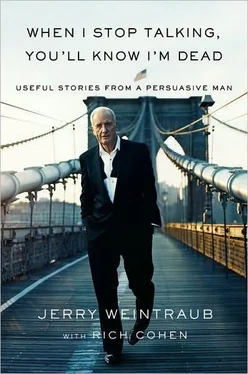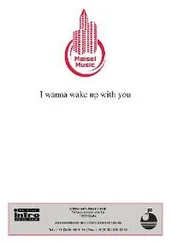Remember how I said everyone was enriched by this process? Well, that is not exactly true. The fact is, when my business took off, the men who ran the old system, the promoters and operators, first got squeezed, then went under. In the academy, they call it creative destruction. I had invented a newer, more efficient model, which meant the old model was doomed. On the street, they call it pain.
The old promoters and middlemen grew to resent me. I was their bogeyman, the devil. The table is covered with settings and piled with food, and here comes Weintraub to pull out the cloth. They called a big meeting on Long Island. (I don't remember the exact year.) You want to feel persecuted? Imagine dozens of record men boarding planes all across the country with a single goal in mind: putting you out of business. The meeting was organized by Frank Barcelona, an agent with a personal beef. He represented Zeppelin. When I made the pitch to promote the band, I went around him, directly to their lawyer-Steve Weiss-who cut a side deal with us, which was a tremendous threat to Barcelona. (Zeppelin was real money.)
The charge against me went like this: "Weintraub doesn't build artists. The local managers and promoters build artists, then Weintraub swoops in and takes them away."
Here's how San Francisco 's Bill Graham, the biggest independent promoter in America at the time, explained it to Newsweek: "Jerry Weintraub comes into town like an eagle, scoops up the money, and leaves. He tells his acts, 'For a piece of the action, I can eliminate certain promoters and agents.' He's more a power broker than a producer."
My answer? Well, hell, yes, of course that's what I do. It's called business. Why do you think I'm successful?
(Bill Graham and I were great friends before this, and we remained great friends.)
I don't really know what came out of this meeting other than a bunch of chatter. The fact is, if a bunch of men are discussing you, meeting about you, and scheming to destroy you, it probably means you're doing something right.
In those years, my key relationship was with the owners of the arenas. That's where I cut my deals and made my profit. The owners were a unique breed, almost entirely gone now, wheelers and dealers, big-money boys, political players, sharpies and sharks, the makers and builders of cities. It was not art or ideas that interested these men. It was bricks and mortar, seats, stages, real estate. A few of them became my teachers. Here I am thinking mostly of Arthur Wirtz, who owned the Chicago Stadium and was one of the truly interesting people of his era.
For a long time, Arthur Wirtz was just a name, like John Doe is a name-I had heard it, but I was not sure where and not sure why. I took an interest only when I started making my way in the concert business. I had two or three months' worth of shows a year and was looking to strike a deal in Chicago, that fantastic market. Chicago Stadium was the obvious place. It had about twenty thousand seats, which is as big as you get before you have to move outside. Other than the Bulls, the Blackhawks, the Ice Capades, and the Circus, which adds up to about a hundred nights a year, the place stood empty.
I went to Chicago and started asking around.
"Who do I have to talk to cut a deal on the Stadium?"
Arthur Wirtz, you've got to talk to Arthur Wirtz.
Arthur Wirtz was huge, six-foot-six, with gray hair. He wore wire-framed glasses, an odd, dandified touch on an otherwise classic Chicago face. He had been to college, but kept something of the street about him, the grit of the west side club rooms. He was like a boss in an old movie, a mountain of a man behind a desk, the city humming behind him-Chicago, with its steel towers and slaughter yards. He had fought his way to the top of a tough town, and I admired him. He made his first fortune in commercial real estate, but his true talent had always been sales. Sell, earn, invest, increase. His family still owns the Blackhawks. He began to acquire things, which is how an ordinary man becomes a titan. By the time I started asking around, Wirtz had become a power in Chicago, the man behind the aldermen, the man behind the mayor.
Though sensible and hard-nosed, he had an eye for showbiz. He built the stadium, then needed to fill the seats. He owned an NHL franchise. It did so well he acquired interests in several others. He came to own most of the teams in the league, including franchises in Montreal, Toronto, and Detroit. He also brought Sonja Henie to America and produced her ice shows, which led to the Ice Capades. He was a giant.
"I don't understand Arthur Wirtz," I told a Chicago friend. "Why doesn't he put other shows in the Stadium?"
"He doesn't want other shows," my friend told me. "He has the Ice Capades, he has the circus, hockey, and basketball. He doesn't know from anything else."
I called Wirtz's office and left a message. No return. I called again. Nothing. It was like shouting into a well. Nothing came back.
Around this time, I ran into Bob Strauss, from Texas. He was a big player in the Democratic Party. I asked him if he could help set up a meeting with Arthur Wirtz. He laughed.
"What's so funny?" I asked.
"You can't just meet with a man like Wirtz," he told me.
"Well, then, how the hell am I supposed to do business with him?"
"You have to talk to Mayor Daley's people first," he told me. "You can't do anything in Chicago without the machine."
"Great, set up a meeting with Daley."
"No, no, no," said Bob, laughing. "You don't actually meet with Daley. You meet with Colonel Riley."
"Colonel Riley? Who the hell is Colonel Riley?"
"Everything in Chicago goes through Daley," he explained, "and everything that goes through Daley goes through Colonel Riley. You meet with him, work it out, then you get to meet with Wirtz."
"Work what out?"
"Just meet him."
I met Colonel Riley in the Bismarck Hotel across from City Hall. This is where the operators and aldermen hung out, where deals got done. We took a table in back. The Colonel hung his jacket on the back of his chair. It was nine in the morning, but the place was filled with newspapermen, union leaders, tough guys, and such. Riley was a skinny Irishman with a patch over his eye. We bullshitted a bit, then he said, "Okay, let's get down to it. What exactly is the nature of your business?"
I told him I wanted to cut a deal to put shows in Chicago Stadium.
"You mean you need to meet with Arthur Wirtz."
"Yeah," I said. "I guess that is what I mean."
"Okay," he said. "I'm going to get up and go the bathroom. And while I'm in the bathroom, you're going to put something in my jacket."
"What am I going to put in your jacket?" I asked.
He told me, and it wasn't two tickets to The Wiz.
"Well, I don't have that," I said.
"You have to get it," he said.
"Oh, God."
"Can you have it by lunchtime?" he asked.
"Yeah," I said, "I guess so."
"Good. Come back here at lunchtime, put it in my pocket, and you will have your meeting with Arthur Wirtz."
A few days later, I go to meet Mr. Wirtz. A two o'clock appointment. He had an office in the Furniture Mart, which he owned. I gave my name to the secretary, then sat, waiting. Now and then, I asked the secretary, "How much longer?" and she smiled and said, "Any time now." Her name, as I learned later, was Gertrude Knowles, and she was fantastic, a multimillionaire with a piece of every one of Wirtz's deals. (He could be very generous.) Two o'clock became three o'clock; three o'clock became four o'clock. I was angry. "What's his problem?" I asked Ms. Knowles. "We had an appointment. I got things to do."
"Relax," she said. "He does this to everybody. If you want something from him, you have to wait."
"I am thinking of leaving," I told her.
Читать дальше

![Сьюзан Кейн - Quiet [The Power of Introverts in a World That Can't Stop Talking]](/books/33084/syuzan-kejn-quiet-the-power-of-introverts-in-a-wo-thumb.webp)










